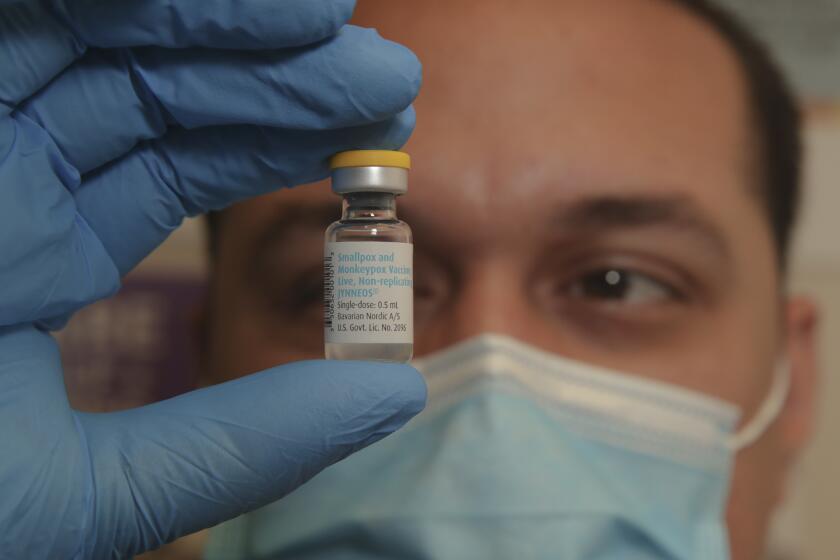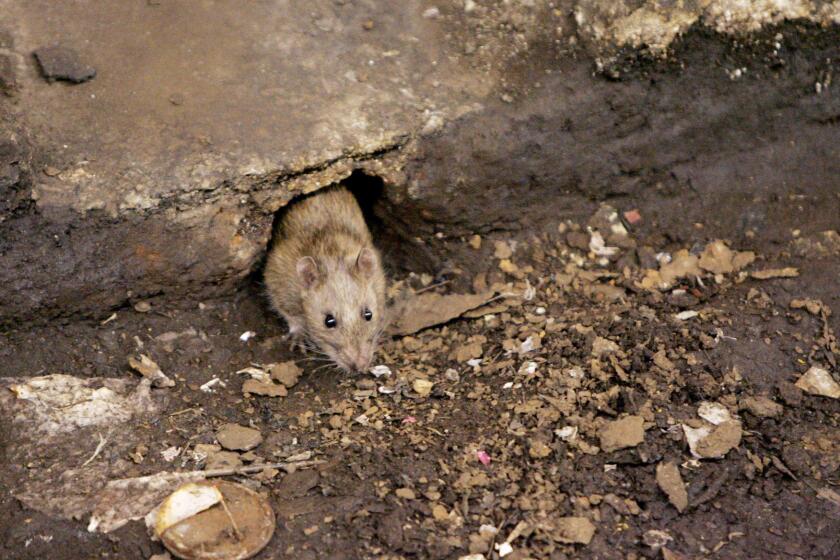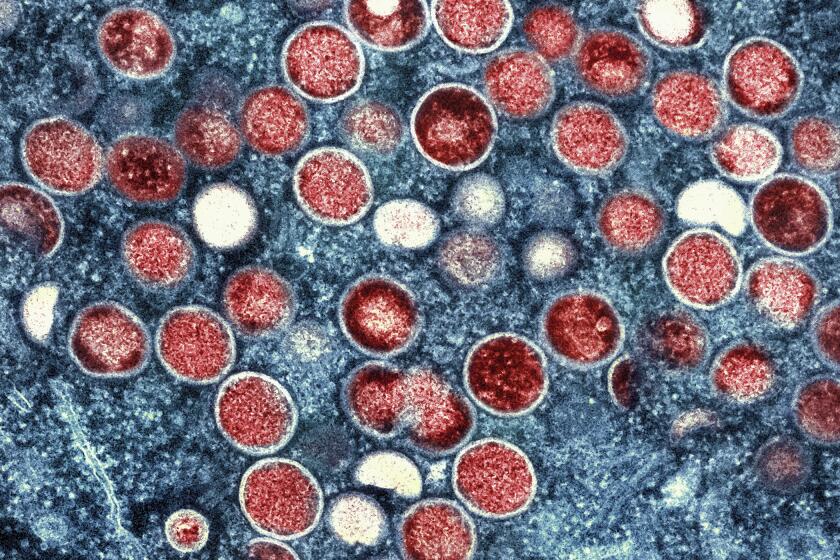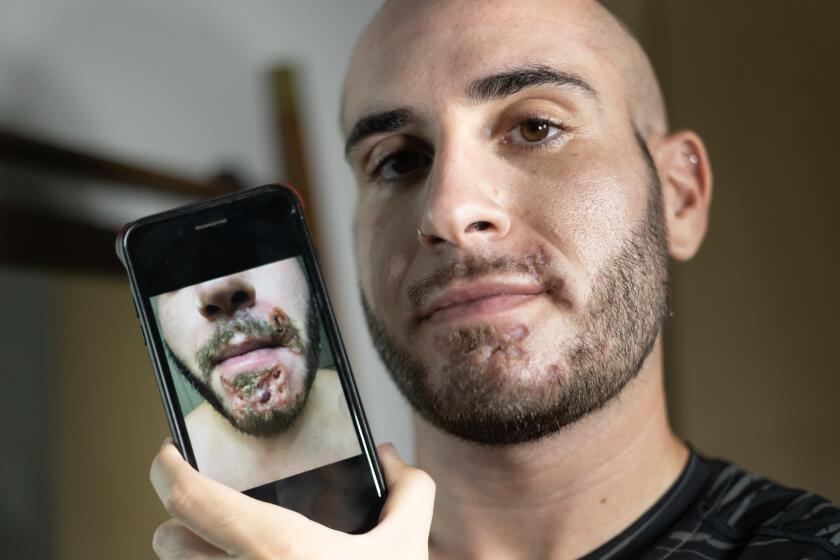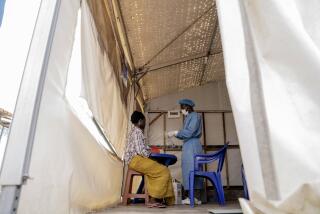MPX? Mpox? The struggle to replace ‘monkeypox’ with a name that isn’t racist
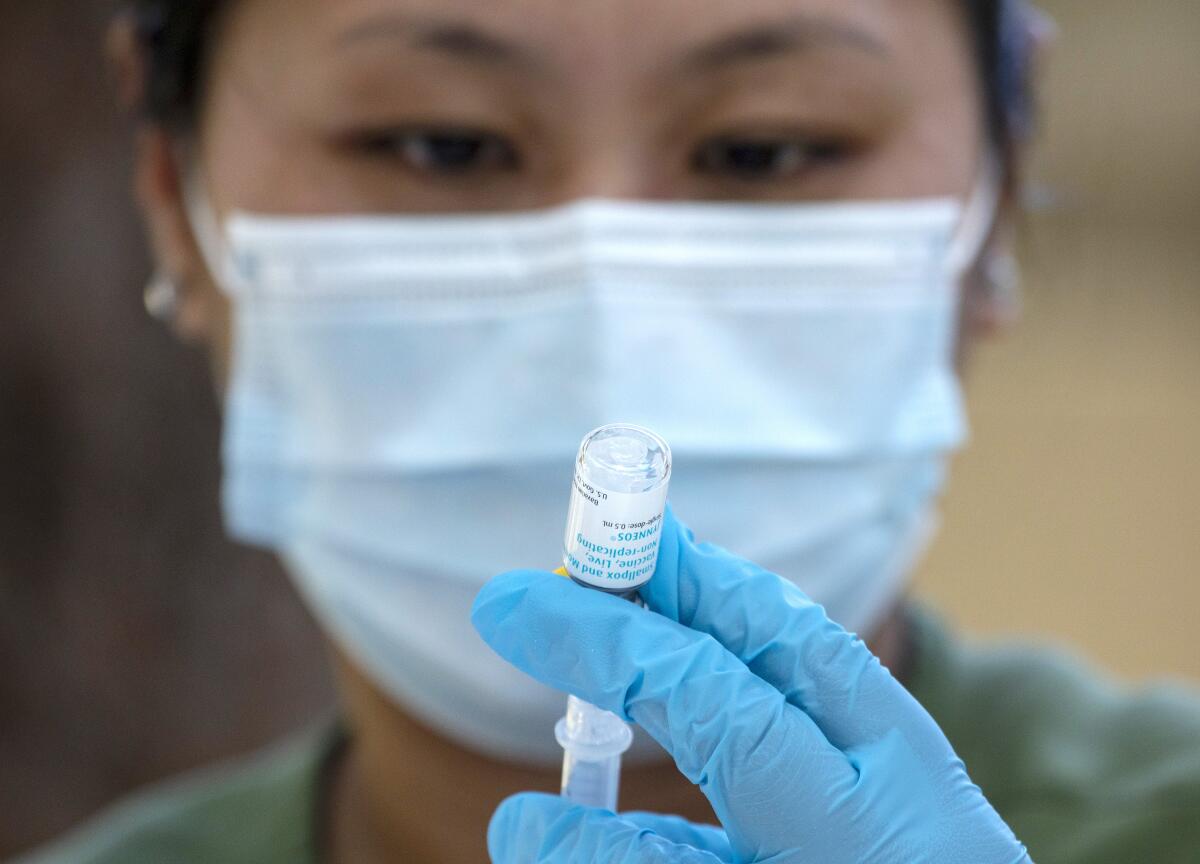
- Share via
Some people argue that the name is racist and disparages an entire continent. Others view it as offensive to gay men. And then there are those who fear it could lead to indiscriminate killing of monkeys, as happened in Brazil.
All that menace from one word: monkeypox.
As the threat from the disease spreads, experts around the world have pledged to change its name to something that doesn’t carry the weight of stigma. No less an authority than the World Health Organization is holding an open forum to elicit suggestions for a new moniker.
“Monkeypox is kind of a strange name to give to a disease that’s now afflicting humans,” said Dr. Anthony Fauci, the U.S. government’s leading expert on infectious diseases.
But tossing out the old name is easier than deciding on a new one.
Already, public health agencies, researchers and nonprofit organizations around the world have taken it upon themselves to abbreviate or shorten the controversial name. But at this point there is little agreement on what to call the disease that has sickened more than 46,700 people around the world.
The California Department of Public Health is referring to it as MPX — pronounced “M-P-X” or “em-pox” — as it waits for the WHO to pick a new name. Officials in Oregon, Vermont, New Jersey and elsewhere have gone with hMPXV. Some LGBTQ community organizations in Canada use Mpox.
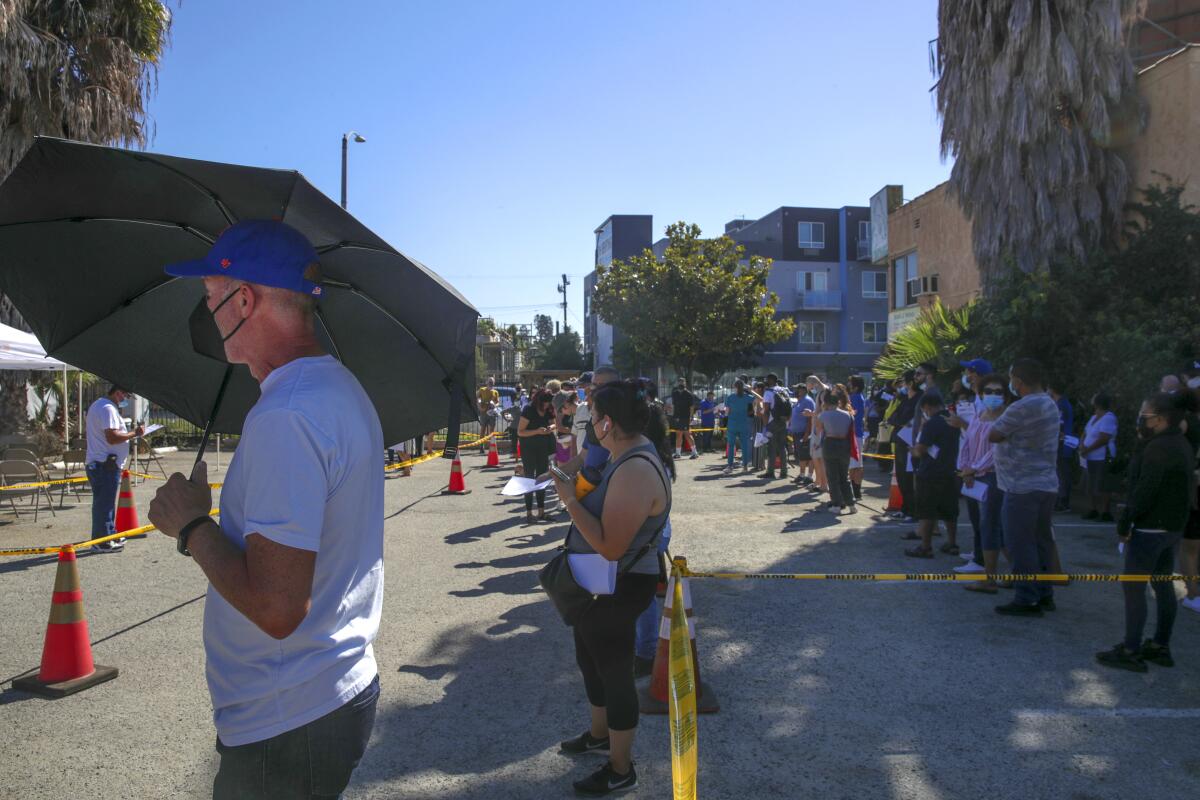
Changing the name of an infectious disease in the middle of a growing outbreak may seem risky. But experts are confident it can be done — and that it would be riskier to do nothing. They fear the current name could discourage patients from seeking treatment, cause people to shun those who are infected, and reinforce racist tropes.
How monkeypox spreads, how to get a vaccine and more: Your frequently asked questions about monkeypox, and answers from experts.
“Is there going to be one solution that’s going to make every single person happy? Nope,” said Dr. Perry N. Halkitis, an infectious-disease epidemiologist and dean of the Rutgers School of Public Health. “But there’s going to be one solution that’s going to be the least offensive of all of the solutions, and it’s going to move us in a slightly better direction with this disease.”
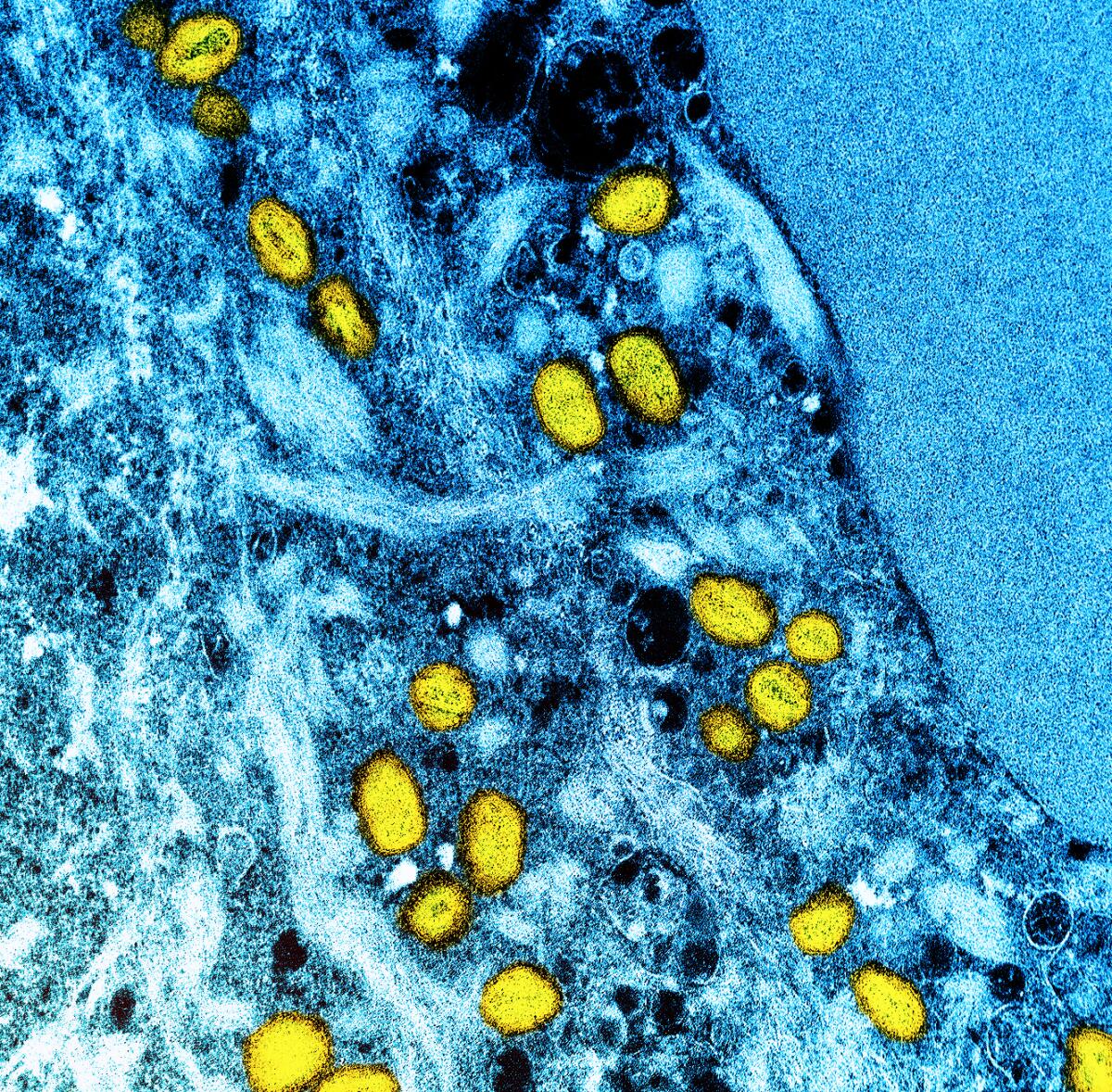
The name dates back to 1958, when the virus was first documented in a group of lab monkeys in a Copenhagen research institute. It’s an orthopoxvirus, a type that’s often named for the animals in which they are initially identified. Its original source in the wild remains unknown, though it’s much more common in rodents than in primates.
Monkeypox was first recorded in humans in 1970, in a 9-month-old boy in the Democratic Republic of the Congo. In past outbreaks animals — especially rodents — have been the primary source of transmission to humans.
The longer the monkeypox outbreak drags on, the more likely the virus will spread to wild animals. If that happens we’ll never be rid of it.
The disease is endemic in rural parts of western and central Africa, where several thousand cases and scores of deaths are seen each year in men and women of all ages. Until recently, the virus was rarely known to spread from person to person. But in the current outbreak in Europe and North America, the overwhelming majority of cases have involved transmission among men who have sex with men.
The condition — characterized by a rash and lesions that can look like pimples, bumps or blisters — can spread through prolonged skin-to-skin contact with those lesions, which may be in hard-to-see places or mistaken for other skin issues.
A cousin of smallpox, it got its name more than a half a century before the WHO, the World Organization for Animal Health and the Food and Agriculture Organization of the United Nations set best practices for labeling diseases in 2015. Two of the no-no’s? Names that refer to countries or geographical locations, and names tied to animals.
Terms such as “swine flu” and “Middle East Respiratory Syndrome” have had “unintended negative impacts by stigmatizing certain communities or economic sectors,” Dr. Keiji Fukuda, a former assistant director-general for health security at the WHO, said in 2015.
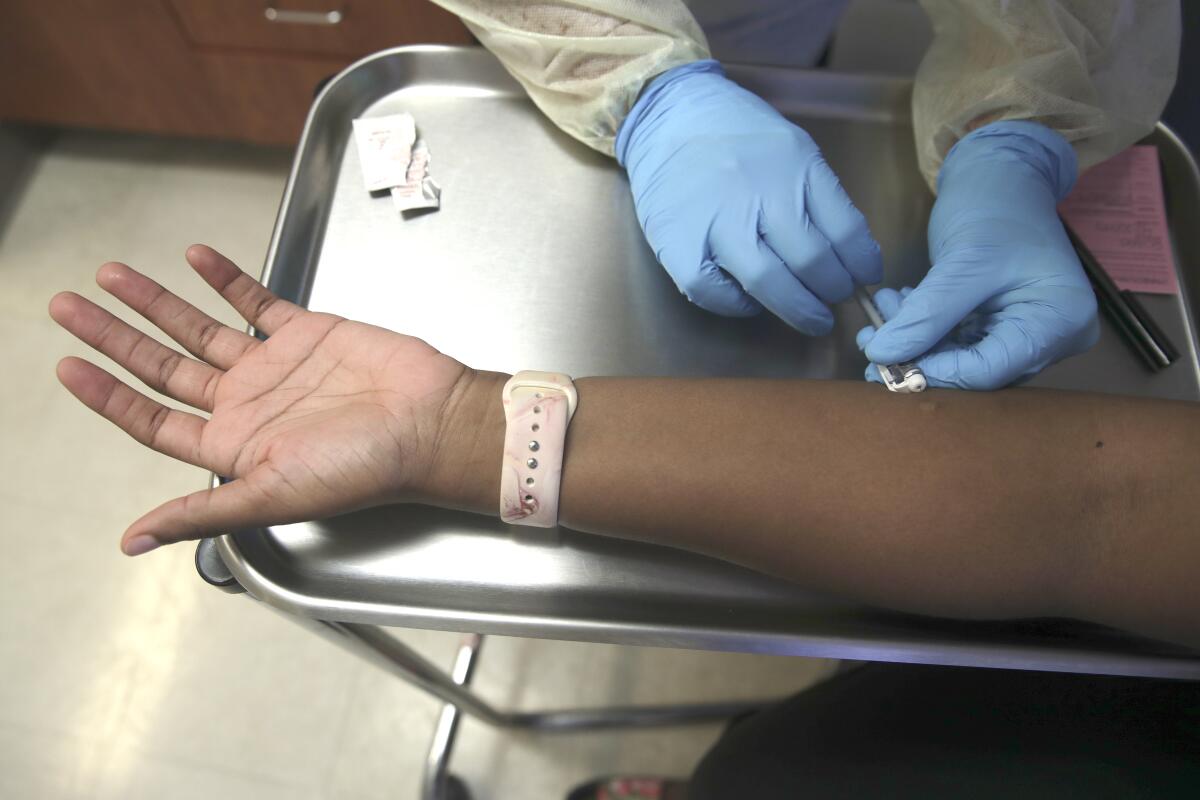
“We’ve seen certain disease names provoke a backlash against members of particular religious or ethnic communities, create unjustified barriers to travel, commerce and trade, and trigger needless slaughtering of food animals,” he said. “This can have serious consequences for peoples’ lives and livelihoods.”
Concerns like these were voiced in June about the fact that the two major groups of the monkeypox virus were known as the Congo Basin clade and the West African clade. An international group of scientists called for those labels to be dropped on the grounds that linking the disease to Africa “is not only inaccurate but is also discriminatory and stigmatizing.”
The World Health Organization is holding an open forum to rename monkeypox
Christian Happi, who helped put the campaign in motion, took issue with media outlets’ use of historical photos of African patients to illustrate an outbreak in the United Kingdom and North America, calling it, “nothing else but racism to the core.”
The WHO agreed with the scientists. This month, it announced that the Congo Basin clade will now be known as Clade one or I, and the West African clade will be known as Clade two or II.
“This was a big victory,” said Happi, the founder and director of the African Center of Excellence for Genomics of Infectious Diseases in Redeemer’s University, Ede, Nigeria. “We in Africa will no longer accept to be undermined. We will stand up to anything that is against the image of this continent or that tries to undermine the image of this continent.”
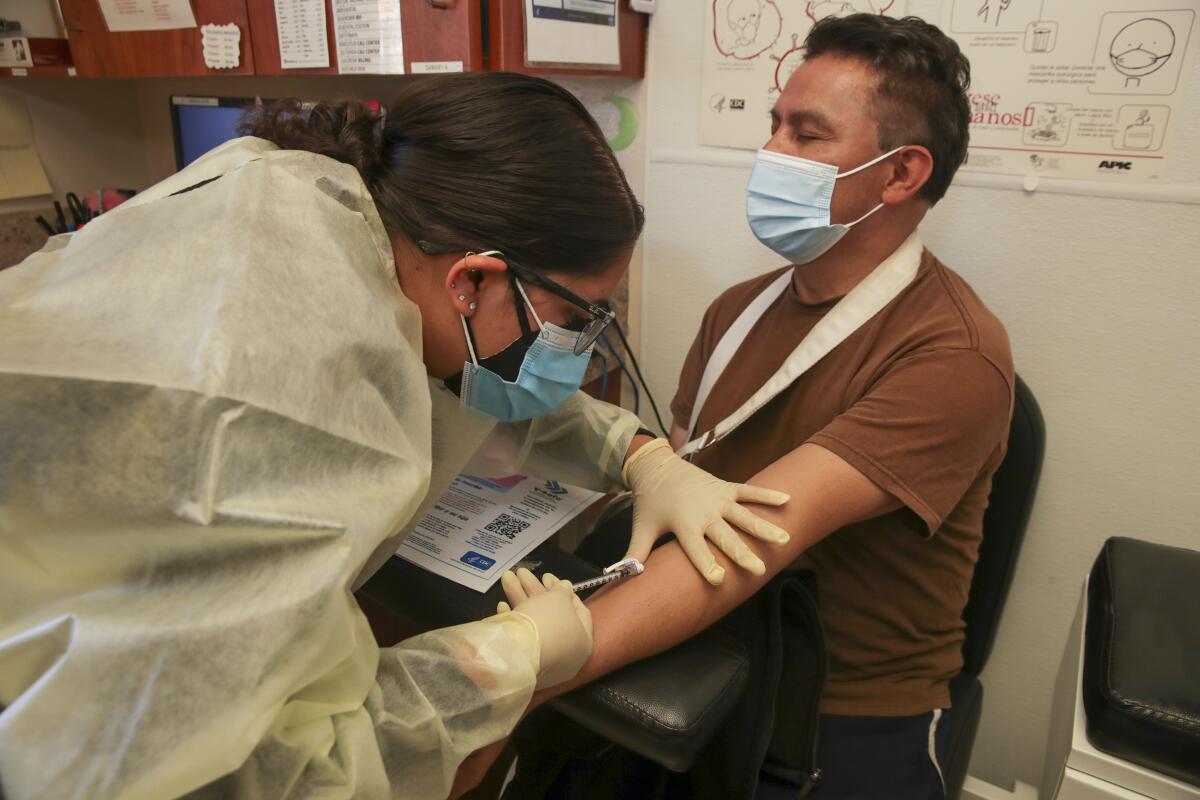
Ask people what they dislike about the name “monkeypox” and you’ll likely get a different answer from each of them.
For Halkitis, it’s that it reflects “a history of nomenclature related to diseases that assigns blame.” He cited the early days of the AIDS epidemic, when the disease was mislabeled as “gay-related immune deficiency” or “GRID.”
“Using the word ‘monkey’ to refer to a virus not only directly links it to an animal that is associated with the African continent, but also associates potentially the behavior of gay men as ‘monkey-like,’” Halkitis said. “In the hands of the wrong people” that can stigmatize those who might be affected by the disease, he added.
Some are asking: ‘Would monkeypox have received a stronger response if it were not primarily affecting queer folks?’
Halkitis isn’t concerned that changing the virus’ name mid-outbreak will sow confusion, but he did acknowledge that coming up with something new won’t be easy.
In a recent seminar at Rutgers, he referred to the disease as “MPX,” an alternative he called “absolutely not ideal” after learning that MPX was the name for a type of submachine gun. He called “Mpox” a possible option, but not a great one because “the monkey attribution doesn’t really go away.”
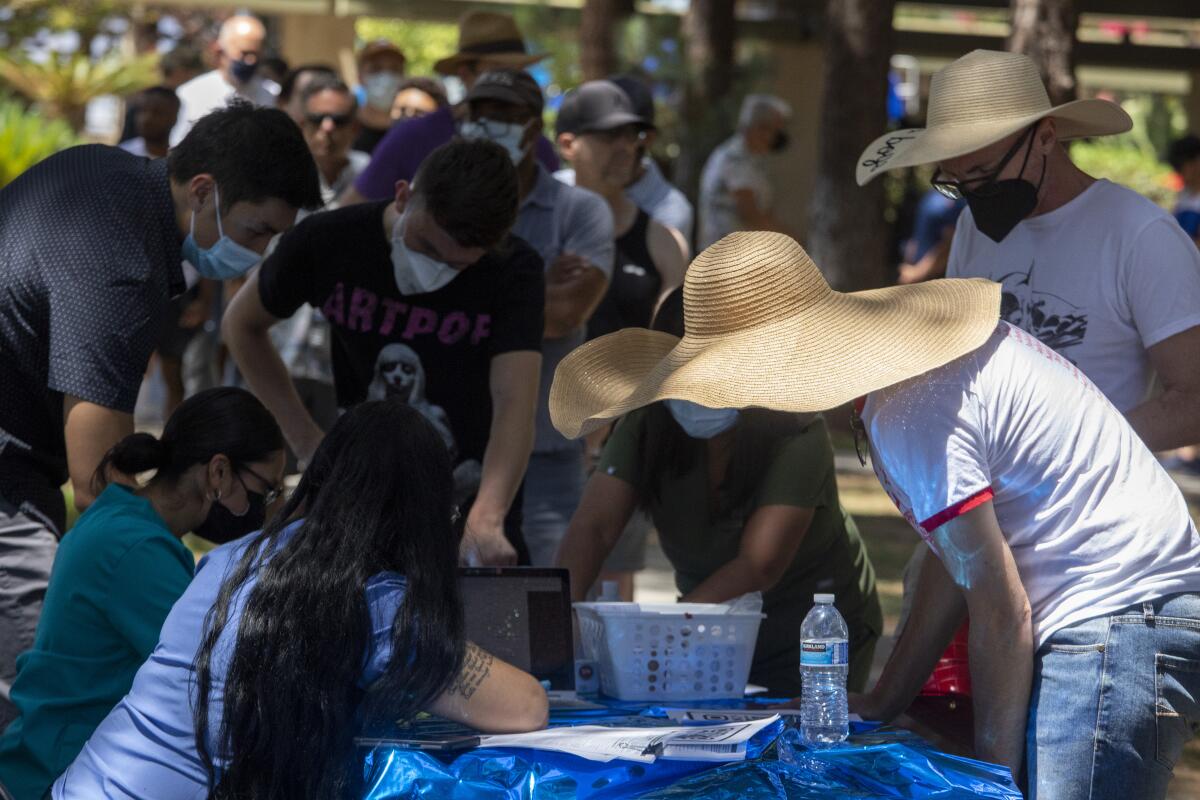
“I think there’s some really smart people out there who work in marketing who can think of a good name,” he said.
Dr. Richard Besser, president and CEO of the Robert Wood Johnson Foundation, said the current name creates a false and disparaging association between monkeys and people who catch the disease, which could create barriers for those seeking care.
Besser was acting director of the Centers for Disease Control and Prevention during the H1N1 flu pandemic in 2009. That disease was commonly referred to as “swine flu,” a practice that “created false associations of people who got the flu with having had contact with pigs.” (The pork industry took a major hit as well, he said.)
“There always are challenges in changing a name of a disease in the midst of an outbreak, but that should not be a barrier to changing the name if the name in and of itself is causing harm,” Besser said. Indeed, he said, the scientific community should look at “a wholesale rebranding of a lot of diseases.”
“There are a lot of viruses that have been named after different places in Africa, which contributes to an inappropriate association of disease and pestilence to parts of Africa,” Besser said.
Kathleen Hall Jamieson, director of the University of Pennsylvania’s Annenberg Public Policy Center and an expert on science communication, takes issue with the fact that the name monkeypox “doesn’t convey useful information.”
The “pox” part is fine because the public is familiar with that word, she said. But the “monkey” part would “suggest it infects monkeys.”
She said the public will easily adapt to a new name once there’s a consensus about what that should be.
“You’d like to have done it before the outbreak,” she said. But, “people will quickly forget what you used to call it.”
The final word on a new name rests with the keepers of the International Classification of Diseases, a comprehensive catalog of health disorders maintained by the WHO.
The renaming process is expected to take a number of months, according to the agency. The WHO will update the public by the end of the year.
“I am sure we will not come up with a ridiculous name,” said WHO spokesperson Fadela Chaib.
Comments left on proposals posted on a WHO website illustrate why finding a new name won’t be easy.
To someone suggesting “Magnuspox”: “Disease names should ideally not use people’s proper names. There are people called Magnus, and they shouldn’t have their names associated with this disease.”
To another proposing “Pox22”: “Monkeypox was first discovered in humans in 1970, so Pox70 would fit better if you wanted to name it like COVID-19.”
And regarding “tinypox”: “monkeypox lesions are even bigger than smallpox ones, so tiny is out of the question.”
For many Californians suffering from monkeypox, getting Tpoxx has not been simple. The smallpox drug has not yet been approved by the FDA to treat monkeypox.
RÉZO Santé, a Montreal-based nonprofit that provides health services to the queer community, submitted a proposal to adopt “Mpox,” a name generated by an alliance of Canadian LGBTQ organizations.
“There were people who immediately spotted that monkeypox in its current form had a bit of a stigmatizing appearance and it was really important for us to move away from that as quickly as possible,” said Samuel Miriello, the director of HR and Partnerships for the organization. Mpox “is the easiest name change to understand.”
The organization recently connected with Jean-Yves Duclos, the Canadian health minister, to discuss the new name, but he worried that making a switch before the WHO decides on a new name could result in confusion, Miriello said. (Duclos did not respond to a request for comment.)
There’s another potential problem with Mpox — it’s already the name of a degenerative disease that afflicts mutants, including X-Men such as Rogue and Cyclops, in the Marvel universe.
Times staff writer Marissa Evans contributed to this report.

